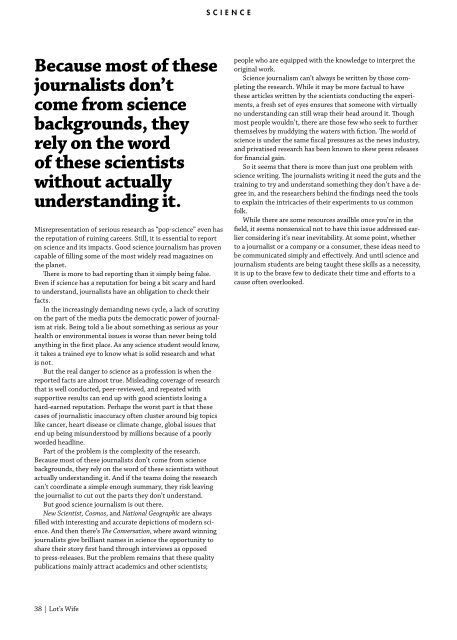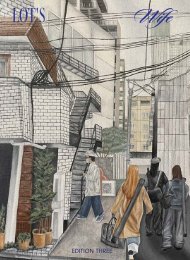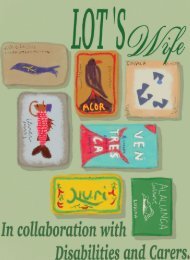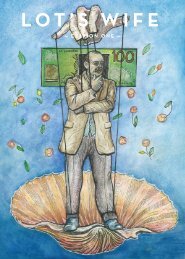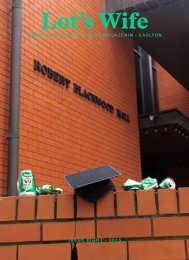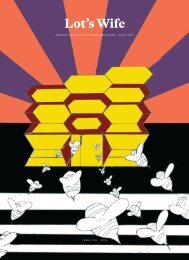Lot's Wife Edition 4 2016
Create successful ePaper yourself
Turn your PDF publications into a flip-book with our unique Google optimized e-Paper software.
SCIENCE<br />
Because most of these<br />
journalists don’t<br />
come from science<br />
backgrounds, they<br />
rely on the word<br />
of these scientists<br />
without actually<br />
understanding it.<br />
Misrepresentation of serious research as “pop-science” even has<br />
the reputation of ruining careers. Still, it is essential to report<br />
on science and its impacts. Good science journalism has proven<br />
capable of filling some of the most widely read magazines on<br />
the planet.<br />
There is more to bad reporting than it simply being false.<br />
Even if science has a reputation for being a bit scary and hard<br />
to understand, journalists have an obligation to check their<br />
facts.<br />
In the increasingly demanding news cycle, a lack of scrutiny<br />
on the part of the media puts the democratic power of journalism<br />
at risk. Being told a lie about something as serious as your<br />
health or environmental issues is worse than never being told<br />
anything in the first place. As any science student would know,<br />
it takes a trained eye to know what is solid research and what<br />
is not.<br />
But the real danger to science as a profession is when the<br />
reported facts are almost true. Misleading coverage of research<br />
that is well conducted, peer-reviewed, and repeated with<br />
supportive results can end up with good scientists losing a<br />
hard-earned reputation. Perhaps the worst part is that these<br />
cases of journalistic inaccuracy often cluster around big topics<br />
like cancer, heart disease or climate change, global issues that<br />
end up being misunderstood by millions because of a poorly<br />
worded headline.<br />
Part of the problem is the complexity of the research.<br />
Because most of these journalists don’t come from science<br />
backgrounds, they rely on the word of these scientists without<br />
actually understanding it. And if the teams doing the research<br />
can’t coordinate a simple enough summary, they risk leaving<br />
the journalist to cut out the parts they don’t understand.<br />
But good science journalism is out there.<br />
New Scientist, Cosmos, and National Geographic are always<br />
filled with interesting and accurate depictions of modern science.<br />
And then there’s The Conversation, where award winning<br />
journalists give brilliant names in science the opportunity to<br />
share their story first hand through interviews as opposed<br />
to press-releases. But the problem remains that these quality<br />
publications mainly attract academics and other scientists;<br />
people who are equipped with the knowledge to interpret the<br />
original work.<br />
Science journalism can’t always be written by those completing<br />
the research. While it may be more factual to have<br />
these articles written by the scientists conducting the experiments,<br />
a fresh set of eyes ensures that someone with virtually<br />
no understanding can still wrap their head around it. Though<br />
most people wouldn’t, there are those few who seek to further<br />
themselves by muddying the waters with fiction. The world of<br />
science is under the same fiscal pressures as the news industry,<br />
and privatised research has been known to skew press releases<br />
for financial gain.<br />
So it seems that there is more than just one problem with<br />
science writing. The journalists writing it need the guts and the<br />
training to try and understand something they don’t have a degree<br />
in, and the researchers behind the findings need the tools<br />
to explain the intricacies of their experiments to us common<br />
folk.<br />
While there are some resources availble once you’re in the<br />
field, it seems nonsensical not to have this issue addressed earlier<br />
considering it’s near inevitability. At some point, whether<br />
to a journalist or a company or a consumer, these ideas need to<br />
be communicated simply and effectively. And until science and<br />
journalism students are being taught these skills as a necessity,<br />
it is up to the brave few to dedicate their time and efforts to a<br />
cause often overlooked.<br />
38 | Lot’s <strong>Wife</strong>


